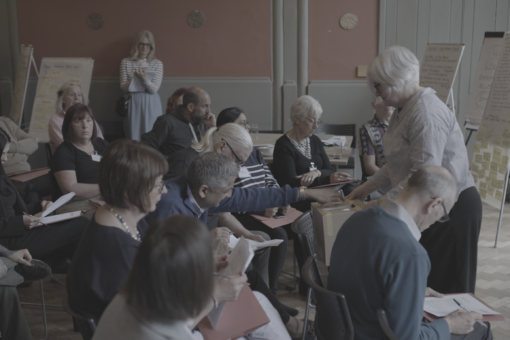
The interim report shares findings from the Jury members, who provided a representative sample of the English population. The Jury participated in a carefully designed 8-week process of deliberation, where they heard from a wide range of experts and considered an array of evidence to obtain a balance of perspectives.
At the end of this process, of the 28 Jury members who were able to participate in the final vote, 20 either strongly agreed or tended to agree the law should change to permit assisted dying in England. This compares to 7 who said they either strongly disagreed or tended to disagree with a law change. One person was undecided.
To go beyond a simple vote and gain insight into some of the ethical complexities surrounding assisted dying, Jury members were asked to work together in forming recommendations for what a change to the law should look like. Together, they agreed:
- People should have a terminal condition
- People must have the capacity to make their own decision
- Both physician assisted suicide (where healthcare professionals would prescribe lethal drugs to eligible patients to take themselves) and voluntary euthanasia (where a healthcare professional would administer lethal drugs to patients with the intention of ending their life) should be permitted
There was also a recognition from the Jury that the work they have done in sharing experiences and perspectives on assisted dying has been immensely valuable in understanding a range of viewpoints and considerations. Together they are calling for further open conversations across society.
At the end of their deliberations the Jury produced a statement, saying:
“Over the last ten weeks we have worked together on the basis of respect and kindness. We have shared our values, ideas, ideologies that people as individuals have, and we have heard everyone’s thoughts and opinions. Merging those together to come to a conclusion has been very special. We have not always agreed on the way forward, but we do all strongly agree on the need have an open conversation across society about assisted dying in the context of a wider discussion about the end of life, helping to remove fear around death.”
Many jurisdictions worldwide, including England, do not permit assisted dying. However, there has been an increasing number considering or passing legislation to permit it in recent years, which has pushed the matter into the spotlight.
Reaching a nuanced understanding of what underpins people’s views on assisted dying, to help inform decision-making at the highest level, requires robust, credible evidence to be collated that is representative of our citizens’ views. In addition, any new insights captured into what the public opinion is, need to be presented accurately and handled sensitively.
This is why we chose to work with Hopkins Van Mil, an award-winning social research agency, to design and facilitate this Citizens’ Jury, which is a first for England. We will not be releasing an organisational view on the topic, but we believe how the Jury has voted, and the recommendations they have formed will address the lack of in-depth qualitative evidence that has been repeatedly cited in political discussions as a reason for not discussing assisted dying further.
Henrietta Hopkins, Director of Hopkins Van Mil, said:
“It has been a privilege to give space, in a Citizens’ Jury, to a diverse group of people to reflect meaningfully over what the key considerations are on whether the law on assisted dying should be changed. The Jury members have demonstrated their commitment to the process, taking the time needed to fully engage with the topic and to take seriously the part they are playing in developing our collective understanding of how assisted dying can be best navigated as a society.
“The Hopkins Van Mil team has thoroughly enjoyed working with the Nuffield Council on Bioethics on this significant and timely project. We hope to see a good level of interest from policymakers who have it within their remit to build upon what the Jury have concluded.”
We appointed an independent Advisory Board for the project. They provided us with impartial and informed, advice and challenge on the project’s multi-method public engagement processes and planning. Members worked to ensure the project was robust, rigorous, and of the highest integrity. The Board also helped ensure the process of content and evidence selection, for the surveys and Citizens’ Jury was balanced, accurate and accessible.
Professor Anne Kerr, Chair of the Nuffield Council on Bioethics’ Assisted Dying Advisory Board, said:
“I would like to extend thanks to the Jury members for their dedication to this project. It is their hard work that has once again highlighted the value that deliberative approaches can bring to democracy, especially when grappling with complex topics such as assisted dying.
Policy makers have been asking for credible robust evidence of what the public think that goes beyond the headline findings of ‘for’ or ‘against’ assisted dying. I am therefore delighted that we have been able to facilitate England’s first Citizens’ Jury on the subject, providing unique insights and data that will no doubt be of huge interest and value to policymakers across Government, Parliament, the NHS and the judiciary system.”
Our interim report provides a summary of Jury questions, results and key recommendations. The main project report, which will expand on the first report will give further detail on the Jury’s deliberations and how the Citizens’ Jury reached their conclusions alongside analysis of two nationally representative surveys, will be published in early 2025.
If you like to hear more about the Jury members’ experience, please take a look at a blog written by Ashok, Daniel and Helen.
If you would like to receive updates on our assisted dying project, which is funded by the AB Charitable Trust you can sign up for the mailing list.
Related projects
-
Public engagement